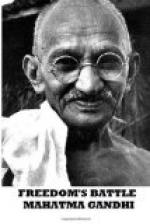WRITTEN STATEMENT
I owe it perhaps to the Indian public and to the public in England to placate which this prosecution is mainly taken up that I should explain why from a staunch loyalist and co-operator I have become an uncompromising disaffectionist and non-co-operator. To the Court too I should say why I plead guilty to the charge of promoting disaffection towards the Government established by law in India. My public life began in 1893 in South Africa in troubled weather. My first contact with British authority in that country was not of a happy character. I discovered that as a man and as an Indian I had no rights. On the contrary I discovered that I had no rights as a man because I was an Indian.
But I was not baffled. I thought that this treatment of Indians was an excrescence upon a system that was intrinsically and mainly good. I gave the Government my voluntary and hearty co-operation, criticising it fully where I felt it was faulty but never wishing its destruction.
Consequently when the existence of the Empire was threatened in 1899 by the Boer challenge, I offered my services to it, raised a volunteer ambulance corps and served at several actions that took place for the relief of Ladysmith. Similarly in 1906 at the time of the Zulu revolt I raised a stretcher-bearer party and served till the end of the ‘rebellion’. On both these occasions I received medals and was even mentioned in despatches. For my work in South




